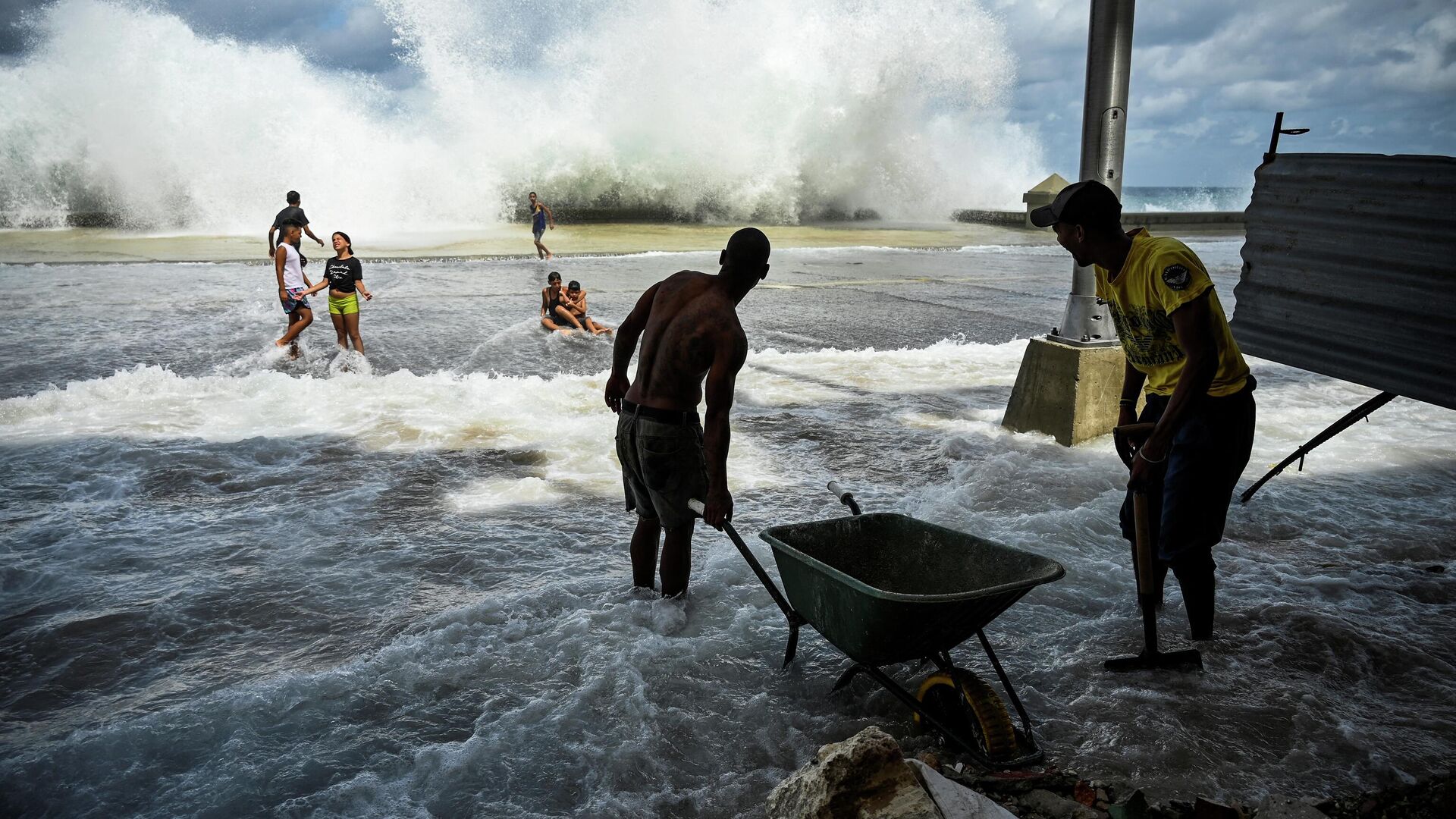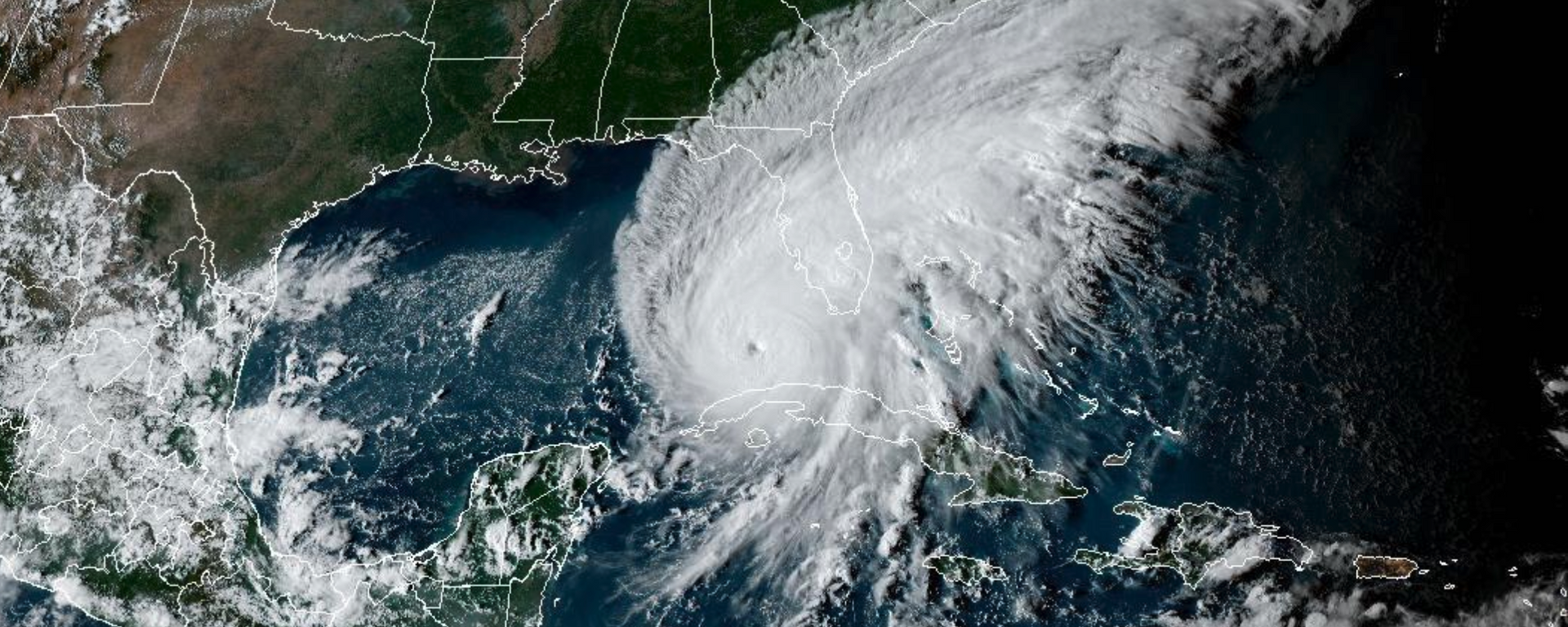Hurricane Ian Manifests Economic Struggle of Working Class in Cuba

© AFP 2023 / YAMIL LAGE
Subscribe
MOSCOW (Sputnik) Tommy Yang - Facing prolonged blackout caused by Hurricane Ian, a factory worker in Cuba explained to Sputnik how catastrophic such power outage could be for ordinary Cubans.
When Hurricane Ian made landfall in Cuba on Tuesday, the powerful tropical storm knocked out the power grid of the entire island and left millions of Cubans in the dark.
Although the storm only hit the western end of the island, causing serious damages to buildings and other structures, residents in other parts of Cuba were forced to face an equally challenging situation even when their homes were still intact.
Just in! Images from Hurricane Ian’s aftermath in Cuba. #HurricaneIan 🌀 pic.twitter.com/mS1E2geg7S
— Koop News (@Koopwines) September 27, 2022
"We've been without electricity for almost two days in almost the entire country. We don’t have any answer or solution, this is disastrous. The food in our fridge has gone bad and everything was lost," Alex Ortiz, a 24-year-old resident from the city of Rio Cauto in southern Cuba, told Sputnik.
When Hurricane Fiona caused lengthy blackout in Puerto Rico last week, locals on the island suffered similar losses as they had to throw away the food in their fridge and could only eat all meals outside in a restaurant where a generator was available.
However, unlike their neighbors in Puerto Rico, where the living standards are much higher, most Cubans couldn’t afford the luxury of eating their meals in a restaurant and losing the food in their fridge could easily lead to starvation.
Ortiz explained why losing the food in their fridge could be disastrous for ordinary Cubans like him.
Food Shortage
Before Hurricane Ian wreaked havoc on the island, Cubans had already been struggling with the worst food shortages in more than two decades. Due to the shortage of food supply, stores that accept Cuban peso, the national currency, usually only have empty shelves.
The supply shortage in those official stores allowed a new kind of "informal markets" to flourish in Cuba. But the catch was that Cubans need to pay US dollars in those "informal markets" or they had to accept the 200 pesos per US dollar exchange rate, which was more than 8 times higher than the official exchange rate of around 24 pesos per US dollar.
"Here the stores sell in US dollars, which is not the currency our salaries are paid in. And one US dollar in the informal markets equals 200 Cuban pesos, while the average salary of a worker is 2,200 pesos per month," Ortiz said.
Ortiz, who works in an ice-cream factory, went on to illustrate what an ordinary worker in Cuba could afford in one of those informal markets that charge a much higher exchange rate.
"In other words, only the one who accepts the 1:200 exchange rate can shop in those stores. If you earn 2500 pesos of salary in national currency, you can only buy 12.5 US dollars [worth of goods]. With that, you can only buy one package of cookies," he said.
As a result, the prices for basic products in those informal markets were astronomical for ordinary workers like Ortiz.
"One pound of meat on the street is worth 200 pesos, a liter of cooking oil is worth 700 pesos, and a pound of rice is worth 50 pesos," he said.
Ortiz makes about 5000 Cuban pesos a month from his job at the ice-cream factory. And with his mother’s income, the family could bring in about 10,000 Cuban pesos each month.
"You just have to ‘invent’ [be creative] as we say in Cuba. I live with my mother and we manage to have about 10,000 pesos a month between the two of us. But it’s not nearly enough for anything," he said.
After losing all the food in his fridge because of the prolonged blackout, Ortiz and his family struggled to put food on the table.
He shared with Sputnik a picture of his lunch, which only comprised a few pieces of deep-fried meat and several slices of bananas.
Risky Escape
The economic difficulties in Cuba have pushed many people to try to move to the United States, even if it meant risking their lives on the way.
"That is why people emigrate to the United States of America looking for job opportunities and a better life. Some get the money to fly to Nicaragua and then cross the border until they arrive. Others just threw themselves into the sea in crude boats," Ortiz said.
During Hurricane Ian, the US Border Patrol agents rescued four Cuban migrants who swam to shore in Stock Island in Florida on Wednesday, after their vessel sank due to poor weather conditions. The US Coast Guard launched an operation to search for another 23 individuals who were on the sunken vessel.
Despite the dangers those migrants faced, many young Cubans like Ortiz would still be willing to take similar risks to look for a better life.
"I have not gone [to the United States] due to lack of money, just as the majority of the people [in Cuba]. But in order to leave this country, I am willing to try everything," Ortiz said.


